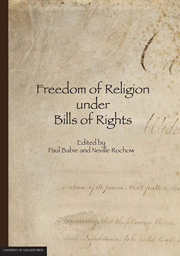Book contents
- Frontmatter
- Contents
- Acknowledgments
- List of Contributors
- Foreword by The Hon Sir Anthony Mason AC KBE: Human Rights and Courts
- INTRODUCTION
- SETTING THE SCENE
- CONTEMPORARY FREEDOM OF RELIGION ISSUES
- 5 Defamation and Vilification: Rights to Reputation, Free Speech and Freedom of Religion at Common Law and under Human Rights Laws
- 6 Should an Australian Bill of Rights Address Emerging International Human Rights Norms? The Challenge of ‘Defamation of Religion’
- 7 Christian Concerns about an Australian Charter of Rights
- 8 Apostasy in Islam and the Freedom of Religion in International Law
- COMPARATIVE EXPERIENCE WITH FREEDOM OF RELIGION
- TABLE OF LEGISLATION AND INTERNATIONAL INSTRUMENTS
- INDEX
8 - Apostasy in Islam and the Freedom of Religion in International Law
from CONTEMPORARY FREEDOM OF RELIGION ISSUES
Published online by Cambridge University Press: 05 June 2013
- Frontmatter
- Contents
- Acknowledgments
- List of Contributors
- Foreword by The Hon Sir Anthony Mason AC KBE: Human Rights and Courts
- INTRODUCTION
- SETTING THE SCENE
- CONTEMPORARY FREEDOM OF RELIGION ISSUES
- 5 Defamation and Vilification: Rights to Reputation, Free Speech and Freedom of Religion at Common Law and under Human Rights Laws
- 6 Should an Australian Bill of Rights Address Emerging International Human Rights Norms? The Challenge of ‘Defamation of Religion’
- 7 Christian Concerns about an Australian Charter of Rights
- 8 Apostasy in Islam and the Freedom of Religion in International Law
- COMPARATIVE EXPERIENCE WITH FREEDOM OF RELIGION
- TABLE OF LEGISLATION AND INTERNATIONAL INSTRUMENTS
- INDEX
Summary
This chapter examines the issue of apostasy in Islam and under the Shari'a, and how this understanding can be reconciled with the practical operation of such an understanding for Muslim minorities under ‘the freedom of religion’ provisions under international law and ultimately under a freedom of religion provision in a putative Bill of Rights.
Apostasy is a question of law under the Shari'a. In examining apostasy under the Shari'a, I first identify relevant sources of Shari'a law and Shari'a, particularly from a perspective of apostasy. Submitting to God, that is, becoming a Muslim, is a free, unilateral acceptance of the Muslim Covenant by proclamation of the shahada. Apostasy is the free, unilateral repudiation of the shahada. This understanding of apostasy is broadly common to many religions. Problems arise with the legal consequences that may still attach to apostasy under some Schools of Islamic law, which in some cases appear to mandate the death penalty for apostasy. If this view is correct, such Islamic law consequences are potentially problematic not only under a bill of rights but also under the general law in Australia, particularly if some Muslims seek to intimidate ‘apostates’ or to try to implement this interpretation on ‘apostates’ in Australia.
This chapter examines apostasy under the Shari'a and whether the Qur'an and sunna, or other religious texts, support capital punishment. Such an examination first requires setting out the definition and meaning of what constitutes apostasy in the context of the Qur'an and the sunna. I conclude that while apostasy is a grave crime under Islamic law, its prescribed punishment is reserved for the Hereafter and, therefore, that temporal authorities do not have jurisdiction over apostasy per se. This view, however, is not universally agreed upon.
- Type
- Chapter
- Information
- Freedom of Religion under Bills of Rights , pp. 152 - 171Publisher: The University of Adelaide PressPrint publication year: 2012



